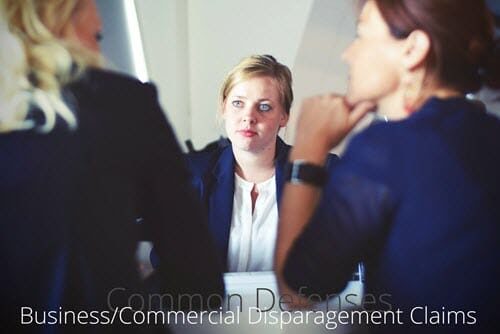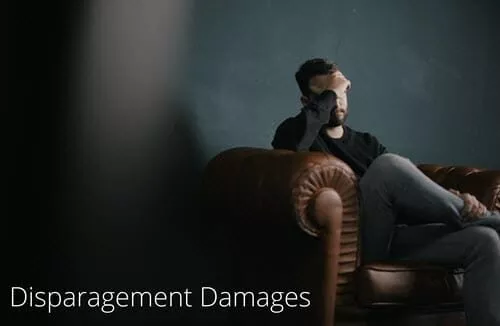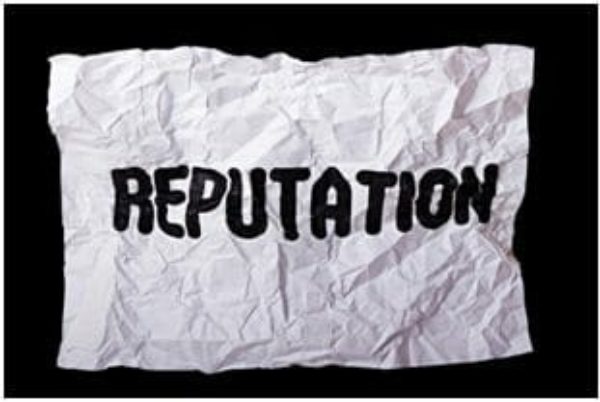
Business & Commercial Disparagement
This page has been peer-reviewed, fact-checked, and edited by qualified attorneys to ensure substantive accuracy and coverage.
First, let’s get down the basics and define what exactly business and commercial disparagement is. Note that both terms can be used interchangeably, and from here-on-out, we will refer to it as ‘commercial disparagement’.
Commercial disparagement is the publication of derogatory and false statements and information about a person’s title to his or her property, hir or her business in general, or anything else made with the purpose of discouraging people from dealing with such individual or business.
The tort of commercial disparagement is an all encompassing and broad term, and may also be referred to as:
- Slander of goods,
- Trade libel,
- Unfair competition, and
- Interference with prospective business advantage.
Regardless of the particular label, a business or person may have an actionable legal claim against another business or person when an oral or written publication of a disparaging statement concerning that business is made.
But, How Come? What’s the Policy Behind This?
Commercial disparagement laws and claims exist to allow for fair competition amongst businesses in a capitalistic and progressive economy. The tort of commercial disparagement not only includes false statements about one’s business, but also false statements about the products or services of that business – more aptly named product disparagement.
Defamation Law Tip: Defamation law generally classifies the party making the defamatory statement as a (1) defamer, (2) libeler, (3) slanderer, or (4) famacide.
Commercial disparagement should not be taken lightly. It could mean sink or swim for your business, profession, and ultimate livelihood, therefore, it’s imperative you strike while the iron is hot and take actionable steps towards removing such derogatory information.
Contact the Cleveland-based business and commercial disparagement lawyers of Minc Law. At Minc Law, we have a nearly 100% removal rate, and all for a flat, reasonable fee. Our goals are your goals, so let us fight for you.
Call us today at (216) 373-7706, or schedule a meeting online by filling out our online contact form.
It’s time to put an end to the online abuse and restore your business’s reputation.
Elements of Business/Commercial Disparagement
Now, let’s take a look at the elements that make up a commercial disparagement claim. There are four core elements at the heart of every commercial disparagement claim, all of which must be met in order to pursue a successful claim.
- The statement is false.
- The defendant either intends the publication to cause financial loss or reasonably believes that the publication would result in financial loss for the business.
- Financial loss does in fact result.
- The publisher acts with malice. (The defendant knows either that the statement is false or acts in reckless disregard of its truth or falsity.)
As you can see, the tort of commercial disparagement is quite broad. For example, the tort covers an individual’s business reputation, such as an accusation that the business is:
- Incompetent,
- Dishonest, or
- Unethical.
The tort also covers false imputing insolvency to merchants, traders, or others in business, as virtually every business is dependent on some form of credit. Simply put, this means commercial disparagement covers statements alleging a business is likely bankrupt or unable to properly finance its operations.
But, how is commercial disparagement different from defamation of character?
Although commercial disparagement and defamation of character appear similar on their face, it’s important to remember that they are distinct and separate torts.
- Defamation is a statement of false fact damaging the good reputation of a person – it may further be broken down into libel (the written publication) and slander (the spoken publication). Defamation of character primarily focuses on the impact a statement had on a plaintiff’s reputation – impact on financial and property rights are merely supporting evidence.
- Commercial Disparagement is exclusive to businesses and cannot be filed by just anyone like a defamation claim. Commercial disparagement claims are for protecting a business’s property and financial rights as opposed to its reputation.
Brand Management Tip: Interacting with customers who air legitimate feedback is an important brand management technique. Doing so shows your business is transparent, willing to compromise, and communicative.
Let’s also take a look at a lesser known law that is a subset of commercial disparagement and referred to as food disparagement laws.
Food Disparagement Laws
Also known as “veggie libel laws” or “food libel laws” food disparagement laws allow food manufacturers, producers, and processors to sue a person or group who makes disparaging comments about their food products.
Generally, food disparagement laws have lower burdens of proof, and in some cases, shift the burden of proof to the party being sued. As of March 2018, there are only thirteen states with veggie libel laws in place, including: Alabama, Arizona, Colorado, Florida, Georgia, Idaho, Louisiana, Mississippi, North Dakota, Ohio, Oklahoma, South Dakota, and Texas.
Oprah Winfrey & The Amarillo Texas Beef Trial
As mentioned above, standards of proof can greatly differ in these cases. For example, in 1998 Oprah Winfrey, and one of her guests, Howard Lyman, were involved in a food disparagement lawsuit – commonly referred to as the “Amarillo Texas beef trial.”
In an airing of one of her shows, Oprah and her guest, Lyman, made disparaging comments about beef and its association with mad cow disease, ultimately creating a media sensation. Both Winfrey and Lyman were sued by beef feedlot operator Paul Engler and the company Cactus Feeders.
As opposed to the traditional libel burden, requiring a plaintiff prove the defendant acted deliberately and knowingly in their dissemination and publication of false statements, Texas food disparagement laws required the plaintiffs prove such statements made by Winfrey and Lyman were not “based on reasonable and reliable scientific inquiry, facts, or data.”
Ultimately, the jury found the statements by Winfrey and Lyman did not constitute libel against the feedlot operator. However, it is worth noting that Oprah no longer speaks publicly on the issue.
Ohio Libel Tip: In contrast to defamation per se, which deems certain statements as so inherently defamatory that the plaintiff need not prove damages for defamation claims, Ohio also follows the legal principle of defamation per quod, which requires plaintiffs prove special damages.

Common Defenses to Business/Commercial Disparagement Claims
So, what happens when a business sues for commercial disparagement. Are there any defenses the person or business who made the statement can rely on?
- Truth: You can’t sue for something that is actually true. Truth is an absolute defense to a commercial disparagement claim. Additionally, statements that are substantially true will be a valid defense – substantial truth concerns statements that are factually true but for “slight inaccuracies of expression.”
- Absolute Privilege: The legal right to say or write something without fearing repercussions or legal action – often made in the course of one’s professional duties. For example, statements made in a judicial proceeding and statements made by a public officer in the performance of his or her duties are considered “absolutely privileged.” Absolute privilege will bar action even when the speaker or publisher made the statement with malicious intent.
- Conditional/Qualified Privilege: Conditional privilege occurs in instances where a defendant has made his or her statement in order to protect his life, good name, family, property, or another legally protectable interest. Additionally, conditional privilege will be applicable to statements made by public officials, such as a professor who (in good faith) writes an unsatisfactory letter of recommendation. It’s worth noting that conditional privilege will not apply when the speaker or publisher made the statement with malicious intent.
- Opinion: If there is an assertion of opinion by the defendant, and not of fact, a plaintiff’s claim for commercial disparagement will fail. However, defendants cannot “cloak” a statement of fact under the guise of it just being “opinion” when it really isn’t. A statement conveying facts to be true, but labeled as opinion, will still open up a defendant to a claim of defamation.
Libel Removal Tip: When dealing with defamation, it’s important to understand other names it might go by. Some other common names of libel include: calumny, vilification, or traducement.
If you or your business has been the victim of commercial disparagement (including food disparagement) reach out to our team of highly experienced defamation removal attorneys. We have litigated hundreds of defamation cases, in over 19 states and 3 countries, securing a near 100% removal rate.
Call Minc Law at (216) 373-7706, or schedule a meeting online by filling out our online contact form. Get started now and put the fire out before it spreads. After all, it’s your business’s reputation and future on the line.

Business/Commercial Disparagement Damages
One important takeaway from this blog post is that the tort of commercial disparagement is not the same thing as the tort of defamation.
But, how are they different?
When bringing a claim of commercial disparagement, there is no need to prove damages. A common element in defamation claims is the requirement for plaintiffs to prove damages or that the statement was inherently defamatory – also known as defamation per se. To read up more on what constitutes libel and slander per se (defamation per se), check out our detailed blog post, “Is it Libel or Slander?”.
Businesses may sue for both defamation AND commercial disparagement if they so wish. However, damages may be nominal, unless specific damage to a business’s reputation or sales is evidenced.
Common damages that may be awarded include:
- Loss of reputation,
- Loss of sales, and
- Punitive damages (punishment damages) – if the conduct is egregious enough.
Ohio Defamation Law Fact: Ohio courts have jurisdiction over defendants who (1) post defamatory material online that Ohio residents view, (2) that material defames a plaintiff with Ohio domicile, and (3) the defendant knew the plaintiff’s domicile is Ohio.

Work With Experienced Defamation Lawyers Today!
The law of business and commercial disparagement is complex and should be approached with a strategic game-plan. If you believe that you or your business has suffered business or commercial disparagement, reach out today to schedule a free, no-obligation consultation with an intake specialist at Minc Law. Call us at (216) 373-7706, or schedule a meeting online today.
★★★★★
“Minc Law and Dan Powell worked closely with us to get defamatory material removed from social media sites. We would not have been able to get this accomplished without them. They are true professionals, and have the resources and skills to guide clients through the process to a successful resolution.”
Jen Duncan, March 4, 2022
At Minc Law, we have nearly 100% success rate, and have litigated cases in over 19 states and 3 countries, securing hundreds of permanent removals. When working with us, here’s what you can expect.
- Respect & Courtesy: At Minc Law, you’ll be treated with the utmost respect and courtesy. We know that online defamation and the removal process can be stressful, so we’re here to make it as easy and simple as possible for you. All of our consultations are confidential, and we take pride in exploring all available removal options in order to secure a swift and permanent takedown.
- Websites & Businesses Respond to Minc Law: As noted above, we boast a nearly 100% removal success rate, and all for a flat, reasonable fee. We know how to contact and work with various site administrators, content managers, and third-party arbitration services to effectively remove content and hold the necessary parties liable.
- We’re Here to Work With You: Once the takedown process begins, some attorneys become unresponsive and distant. At Minc Law, our attorneys will stay in constant contact with you concerning important details and updates surrounding your case.
It’s important to remember that not all laws surrounding commercial disparagement are the same, and may greatly vary by case and state, therefore it’s highly recommend you reach out to experienced professionals who know the ins and outs of commercial disparagement.
Online Reputation Management Tip: You can set up a free SERPLab account, an online keyword tracking tool. Doing so will help you locate your highest ranking keywords, and the various pages they are tied to. It can also help locate the rankings of any negative posts or reviews as well, and provide a base for future action.



